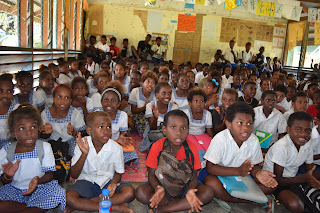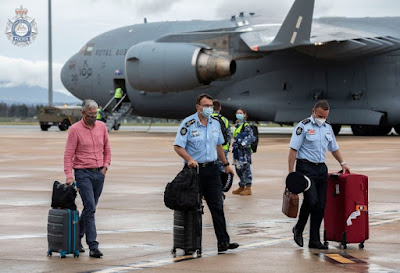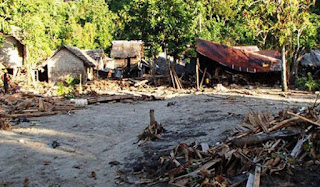THE GOOD AND BAD OF ROYALTY
BY GEORGINA KEKEA
BELAHA School in Central Guadalcanal is located in one of the lucrative spot of royalty. In Guadalcanal, people from Central Guadalcanal are said to be one of the prime beneficiaries of monies from operations through mining, logging, gravel but to name a few.
BELAHA School in Central Guadalcanal is located in one of the lucrative spot of royalty. In Guadalcanal, people from Central Guadalcanal are said to be one of the prime beneficiaries of monies from operations through mining, logging, gravel but to name a few.
 |
| Belaha school children |
With more
than 300 students ranging from Early Childhood, Primary to Secondary, Belaha is
one of the many schools in Guadalcanal that still practice open-defecation and also
faces deregistration.
School Principal Francis Labu says Belaha School is a long
way to meet the WASH Standards set by Ministry of Education and Human Resources
Development (MEHRD).
He said the recent launched WASH standard calls for greater cooperation from the schools.
He said the recent launched WASH standard calls for greater cooperation from the schools.
“We do not
really have the support from our parents as one would expect. Probably because
they do not see education as important for their children because they already
benefit from monies from royalty and do not see the need to have their children
going to school. Because school or no school, they will have money anyway,”
Labu said.
He said
these are some challenges the school is faced with. Though there is support for
the school, it is very minimal.
He said
often, Solomon Islanders relate education to work to make money but this is not
the case.
“Education
makes us think and open our minds to new ideas. Education is not only to have a
job to make money.”
He said
being a school in rural area, they are quite flexible with how they do things.
Some of the
students walk an hour to get to school and some crossed rivers and streams
prone to flash floods and so they do not really have an accurate data on why
students do not come to school.
However in a
study done by UNICEF, girls are often the ones most prone to miss classes when
there is lack of water and sanitation.
 |
| Tenaru River |
The report
said lack of adequate WASH facilities and supportive environments at schools
disproportionately affects girls.
The report
continued to say that absenteeism is high when there is lack of water and
sanitation.
For Belaha
School, it was reported that they do not groom much students in the work force
as much as they would love to.
So far since
its establishment, only two ni-Belaha students had been able to further their
education to University level.
It is the
trend to see students going to school for a short time only and mostly those
from outside the community has been able to complete their studies.
He said it
is often the norm to see students from that area dropping out from school when
they reach higher education.
This is
often attributed to the fact that they do not see the need to further their
education because they have an avenue where they can earn money without the
need for education, Labu said.
“First
through Goldridge, during the mining days where people pan for gold and then
now the current logging operations and we still have the Tina Hydro project
forthcoming.
“We have
been established for quite a while now. The registration of this school was
done during the Goldridge days. That was when the company provided water supply
and other basic needs to keep the school running. When they left, everything
just went downhill from there,” Labu said.
Despite the
shortfalls and lack of support for the school, Labu is optimistic that they
will meet the standard expected of them soon.
 |
| School children walking back from school |
He said
things are starting to change for them as the connection they have established
with the company operating in their area has shed some positive light in their
development plans.
Also they
are now waiting for the implementing agency for their WASH project to assist
them implement their water and sanitation project.
Recently, Galego Company the company doing logging operations in their area had donated
$20,000 for the school.
Labu says if
the WASH project is not forthcoming as yet, they will then use this money to
build an ablution block for the students.
Currently Belaha School has 18 teachers but only eight staff
houses.
They are now planning to visit Galego soon for assistance of
timber to build new staff houses and for transportation of logs to their area
so that they can start work on the staff houses.
Labu says they have big plans for the school but they need
the support from their local community.
ENDS ///




Comments
Post a Comment